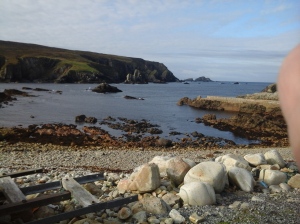We are confounded, once again.
Suppositions, stereotypes, generalizations, abstractions: these collide as we await the facts.
Apprehending facts, understanding shuns us.
We discern no single truth will ever revive the moment that broke our world.
Narratives – colored by dogma; reenactments – suffused with pain; chronicles – cold with science; reports – protective of particular interests; all emerge, and, in profusion, crowd the event itself. Uncertainty and shared vulnerability; guilt and shame; sorrow and loss; power and powerlessness; these are now the stuff of advancing legend and turgid conflict.
If it is a young white man with a gun, the surge to blame the bullies; invective on the doctors and the teachers who let that man-child walk unmedicated on the street. Condemn the mothers, and the videos, and Hollywood. And, of course, the gun laws, our cowboy culture caused the crime.
If we face a military mass murderer, our cries become less certain. Again, the doctors, and the gun laws are to blame. But we, also, shoulder shame: we mistreat our “heroes.” Those we trained to kill for country, asserting a just cause, conceiving war will leave no trace on the young psyche; the fragile soul sent forth in isolation, sometimes desolation, and discarded on his return.
And if police personnel kill, our bonds may fracture: this collusion that we all risk as much each day. More splintered if the kill happens to be racial: that this is not happenstance is suddenly exposed.
Certainly, not because white cops seek to kill black children. And, not because those of color commit more crime. But because how we deploy our civilian control resources puts those with less more at risk than those with enough.
But, in the frenzy and the fury that follows the murder, in the necessary quest to grasp the moment, restore order, and prevent another kill, the seeds of fundamental change are never sown.
Nor is the ground prepared.
Individual justice may not be possible.
And the roar which follows, creates a tunnel of distortion.
Calls for basic education are silenced by talk of higher taxes. Pleas for jobs with living wages are termed disloyal and greedy. Proposals for representation of all races in government and industry are discarded as “racist.”
We have entered a passage where shrilled voices dissipate without communication.
Ours is a pornographic relationship with the gun. The constitution did not guarantee private home military arsenals. But in the days of 3D printers, the gun control lobby cannot continue to fight the battle it did in 1985.
Violence occurs by gun. By knife, machete, fist and bean bag bullet. Drug overdoses and untreated viruses in poor communities deliver violent death. Violence is imposed through hunger caused by poverty, by disease, by inadequate housing. Income inequality is violent.
Around the country, the brave are speaking loudly; some so clearly the great vacuüm of purpose may be filled.
Again, there are vigils which mythologize the vibrant humanity of the dead.
Still, more are dying, more are killing, old refrains are repeated, too few are listening.
If any one of us succeeds in exiting the tunnel, perhaps change could be instigated. Not through some major media event or by savvy use of the internet, crowd-funding or any other modern, inspired, tactic. Perhaps, the time has come for wholly “retro,” and in that sense, “conservative” action: perhaps the time has come when the only voice clearly heard is our own: the change we seek must begin within ourselves ,and, once seeded there, in our sphere.
“Everyone thinks of changing the world, but no one thinks of changing himself.” Leo Tolstoy.
http://www.blogsbywomen.org.





